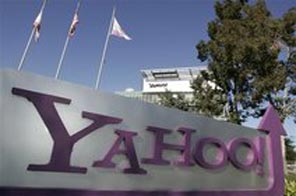Yahoo 2Q profit rises 8 pct despite weak ad sales
SAN FRANCISCO: Yahoo Inc. eked out a slightly higher profit in the second quarter as its new, no-nonsense chief executive cut enough expenses to shake off the Internet company's sharpest drop in ad revenue since the dot-com bust.
The worsening ad slump overshadowed Yahoo's first quarterly earnings increase since the start of 2008, causing the company's shares to fall more than 2 percent after the results were released Tuesday.
Yahoo also said it will spend at least $75 million promoting its brand, hiring more engineers and improving some of its services during the third quarter. On top of that, the Sunnyvale-based company expects to surrender about $75 million in revenue by reducing the volume of ads that management has identified as being too obnoxious.
Both those plans threaten to crimp third-quarter profits unless ad sales bounce back.
Carol Bartz, Yahoo's CEO of the past six months, said advertisers appear willing to spend a little bit more during the second half, although she stopped short of predicting better times ahead.
"There's just so much conflicting information in the market that it's just too early to call," Bartz told analysts in a conference call Tuesday.
Yahoo earned $141.4 million, or 10 cents per share, in the three months ending in June. That was up from income of $131.2 million, or 9 cents per share, last year.
Analysts surveyed by Thomson Reuters had predicted Yahoo would earn 8 cents per share.
Revenue for the period slid 13 percent to $1.57 billion. That's the biggest decline so far in a three-year slump that has seen Yahoo fall further behind Internet search leader Google Inc. in the online ad market.
By contrast, Google's revenue rose 3 percent to $5.5 billion in the second quarter.
After subtracting commissions paid to its advertising partners, Yahoo's revenue stood at $1.14 billion. That matched analyst projections.
Yahoo shares slid 45 cents, or nearly 2.7 percent, in extended trading Tuesday after the results were released. Earlier, it finished the regular session down 26 cents at $16.75.
The higher second-quarter profit suggests Bartz is successfully weeding out some of the problems that plagued Yahoo under its two previous CEOs, company co-founder Jerry Yang and Terry Semel.
Since her arrival, Bartz has been identifying Yahoo's strengths and weaknesses, streamlining the company's decision making and cutting deeper into a payroll that had already begun to thin under Yang.
Yahoo ended the quarter with 13,000 employees, down 9 percent from 14,300 workers at the same time last year. That enabled the company to lower its cash expenses by about 25 percent, excluding severance costs, said Tim Morse, a cost-cutting specialist whom Bartz recently hired as Yahoo's chief financial officer.
"The quarter was a mixed bag, but I am pleased we could control the things that we could control — and that was the cost side of the equation," Morse said in an interview Tuesday.
Yahoo encountered its biggest problems in the lucrative search market that generates most of Google's profits. Yahoo's ad sales alongside the search results appearing on its own Web site fell 15 percent to $359 million.
As a possible remedy, Yahoo has discussed turning over its search advertising sales to rival Microsoft Corp., which is eager to pick up more market share to mount a more serious challenge to Google. A blog affiliated with The Wall Street Journal reported the two sides are getting close to reaching a deal that could be announced as early as this week.
Although Bartz wasn't asked directly about the Microsoft talks in Tuesday's conference call, she praised a recent upgrade to her rival's search engine — now called Bing.
"Microsoft should be given kudos for Bing," Bartz said. "I think they've done a nice job."
Meanwhile, Yahoo is sprucing up its highly trafficked home page for the first time in three years to make it easier to see what's happening at the Internet's other hot spots. The makeover made its debut in the United States Tuesday.
Even as Yahoo allows its users to plug into popular online hangouts like Facebook and MySpace, Bartz said the company intends to remain "the Internet king makers at the center of the online ecosystem."






